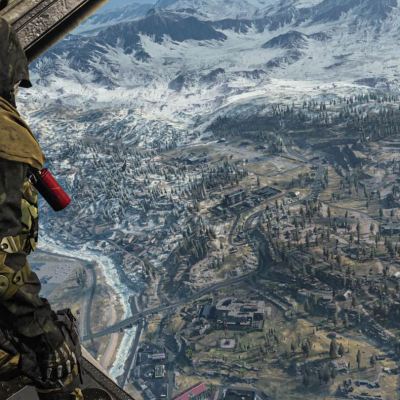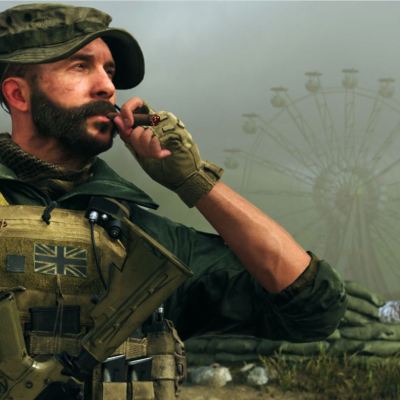Call of Duty Black Ops: Cold War – Who Is Yuri Bezmenov?
Who is the unlikely star of the first Call of Duty Black Ops: Cold War trailer? Here's what you need to know about Yuri Bezmenov:

The official debut trailer for Call of Duty Black Ops: Cold War has finally arrived. While we’ve known for quite some time that the next Call of Duty game would focus on the Cold War, we weren’t quite prepared for the nature of the trailer itself.
It’s an odd preview filled with cryptic messages and a distinct lack of action sequences. Most notably, though, it focuses on an old interview featuring a mysterious man with some cryptic warnings about the slow takeover of a nation and its people. Well, that man is named Yuri Bezmenov, and he’s one of the most quietly important figures of the Cold War.
In an attempt to slowly uncover just what Call of Duty Black Ops: Cold War is all about, we’re going to examine the real history of Yuri Bezmenov, the context of the interview featured in that trailer, and what it all means for the upcoming game.
Who is Yuri Bezmenov?
Yuri Bezmenov was born in Mytishchi, Russia in 1939. At the age of 17, he attended a KGB run school called the Institute of Oriental Languages. It was there that he became especially interested in the culture and history of India. This pursuit was seemingly encouraged by many of his instructors (which included military officers who oversaw Bezmenov’s mandatory military training) as they often looked or promising young students who could be used as international operatives.
Bezmenov eventually moved to India in 1963, where he worked as a translator for a company that built refineries. In 1965, though, he moved back to Russia to work for a state-controlled media organization called RIA Novosti. There, Bezmenov was asked to write propaganda designed for foreign distribution and perform various tasks involving international relations. Eventually, Bezmenov was converted into an official informer who specialized in misinformation. Bezmenov quickly became a valuable asset to the Soviets, especially when it came to helping Soviet officials establish a stronger propaganda network in India.
Bezmenov would later reveal that he gradually started to become concerned regarding the nature of the tactics he was asked to utilize and what effect they were having on the world. He decided to defect to the West in 1970 and actually managed to do so by disguising himself as a hippy and blending in with a tour group. This deception took him to Greece, where he eventually established contact with the CIA and was able to convince them of his sincere desire to defect and how useful he could be as a defector despite KGB claims that he was little more than a clerk.
The CIA helped arrange for Bezmenov to move to Canada, where he attended the University of Toronto before becoming a journalist. Bezmenov became a surprisingly forward-facing personality despite the secretive nature of his defection and earlier activities. Actually, those factors soon contributed to him becoming one of the foremost authorities on the tactics and reach of the Soviet propaganda network.
What is Yuri Bezmenov Saying in the Call of Duty Black Ops: Cold War Trailer?
Yuri Bezmenov’s appearance in the Call of Duty Black Ops: Cold War trailer is taken from this 1984 interview between G. Edward Griffin and Bezmenov:
In that interview, Bezmenov downplays the idea of “espionage” and “intelligence” (at least in the sense of how we’re familiar with those ideas thanks to James Bond movies) being the key points of Soviet attempts to overthrow the United States or an accurate representation of how similar takeovers occur. Instead, he outlines the four key stages of what would later be described as the “Soviet subversion model.”
The first stage is “demoralization.” Bezmenov says this process takes 10-20 years and involves changing the mentality of a generation of young people to abandon common sense ideologies and embrace new ideas that cannot even be countered by plain facts. As an example, he references the idea of students of the ’60s growing into the leaders of America despite suffering from demoralization. He suggests that the process of demoralization has reached a point of nearly unprecedented success where Americans began applying it to other Americans without additional outside influence being required. He theorizes that most people will not be able to recognize that this process has happened until it begins to directly impact them in an overt way.
The second stage is “destabilization.” Bezmenov says that if demoralization is completed, this process can only take 2-5 years. It essentially involves targeting key aspects of a nation (including economy and defense) and replacing the ideology with that of the influencing party.
The third stage is “crisis.” Just as it sounds, this part of the process basically involves generating mass chaos. Bezmenov notes that the crisis process can be initiated in as little as six weeks. He referenced the then-current situations in Central America as an example of the crisis process.
The fourth and final stage is “normalization.” This is the point when the subversion model has been completed and can theoretically last indefinitely. Once normalization has occurred, the power structure remains under the control of the best liars who use a constant stream of propaganda to continue to convince everyone that they are living in a glorious age of peace and prosperity. Once this has truly taken hold, the country will then essentially become a perpetual motion machine that continues the ideas of subversion by willfully passing them on to a new generation.
The conclusion of Bezmenov’s speech warns that the only way to truly stop this process is to educate people on these methods so that they remain vigilant. Otherwise, he says that a country will soon lose its most important freedoms.
What Does Yuri Bezmenov’s Speech Mean for Call of Duty Black Ops: Cold War’s Plot?
The full answer to this question likely won’t be revealed until we’ve played Cold War, but the nature of the speech makes it easy to draw some reasonable conclusions.
First off, the “elephant in the room” is the relevance of Bezmenov’s Speech in relation to current events (specifically in the United States). The timing of this trailer is almost certainly deliberate in that respect, but in the interests of not shutting down this conversation by citing obvious parallels and limiting the scope of that speech to name drops and specifics, it should be noted that this speech was made in 1984 and deals with general philosophical ideas and historical events which could easily happen again. It deals with the idea of a slow takeover of society using propaganda and institutional practices as opposed to violent, obvious actions that achieve the same effect. It’s a warning that doesn’t need names, hashtags, or cute comedic jabs because it’s a warning about how we can easily (perhaps even unknowingly) perpetrate such evils by finding pride in ignorance and blind trust.
So far as the game goes, it’s easy to assume that the use of this speech is meant to serve as a tell that Cold War will not rely as heavily on traditional cinematic elements such as outright warfare. Instead, it sounds like Cold War will deal more with the idea of a slow takeover of society using propaganda and institutional practices.
Since this is a Call of Duty game, though, we suspect there will still be plenty of action. Rumors point to the next Call of Duty game utilizing the Vietnam War, but if we had to guess, we’d say that additional action sequences will occur as this game likely veers into a slightly alternate timeline that uses real Cold War events at the basis of a conflict between The Soviet Union, The United States, and other associated parties which could even stretch into the modern-day. After all, Bezmenov’s speech is really about how patience, dedication, and time can bring down any society.


